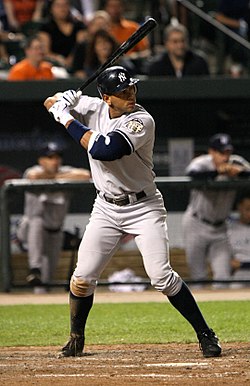Friday, August 24, 2012
The Rise of the Athletic Class
There are three economic classes in the United States -- upper class, middle class, and lower class. Sure, there's variations within each (upper middle, lower upper, lower lower), but it's basically those three.
Since the turn of the millennium, though, I would say that a fourth pseudo-class has formed --- the athletic class. Although this case could be made about any of the four major sports, I'll just focus on baseball. In 1992, on the cusp of free agency, Barry Bonds signed a 1 year - $4.7M deal with the Pirates. At that time it was the largest in baseball and the minimum salary was approximately $105,000. After the 1992 season, the Pirates offered him 5 years - $25M to stay, but he rejected them and signed with the Giants for 6 years and $43.75M. The rest is roid history.
Today in 2012, Bonds' $4.7M is what a slightly above-average hitter can expect to make in his 2nd year of arbitration (think Garrett Jones this upcoming year), not in his 3rd year of arbitration like the great Barry Bonds. In 2012, the minimum salary is $480,000, which is a figure that the common man can not relate to, unlike in 1992. Think about Pirates' middle reliever Jared Hughes -- if he hangs around for 4 years, he'll have earned $2M probably, just as he turns 30.
For additional perspective, by the time Alex Rodriguez's current contract expires in 2017 (unlike his body which started to expire in 2011), he will have earned around $500M in salary. That doesn't even count any endorsements.
What are today's athletes, especially the ones that get the first and second free agent deals, going to do with all their money? Using the Yankees again, take recently acquired-from-waivers Derek Lowe. When his current contract is done, he'll have earned over $110M. Lowe was a very good, but not great, pitcher for many years. He can take care of 5 generations of Lowes with his money, ensuring that they never have to worry about a job if they don't want one.
Will these athletes put their money to good use? Will they help contribute to finding a cure for some disease? Will they go back to their hometown and inject money in the business community or help them pave roads or aid the (most likely) struggling school system?
Or will they sit in their silo of money and roll around in it like Scrooge McDuck? Watching the athletes perform today is interesting, but watching the next 10-15 years and see if there is any spillover effect from them earning all this money is fascinating.
Subscribe to:
Post Comments (Atom)

Does the Scrooge McDuck option include having to put up with that uber-Milhouse, Launchpad McQuack?
ReplyDeleteIf so....I'll take whatever the other option was. McQuack's a freeloading douchebag.